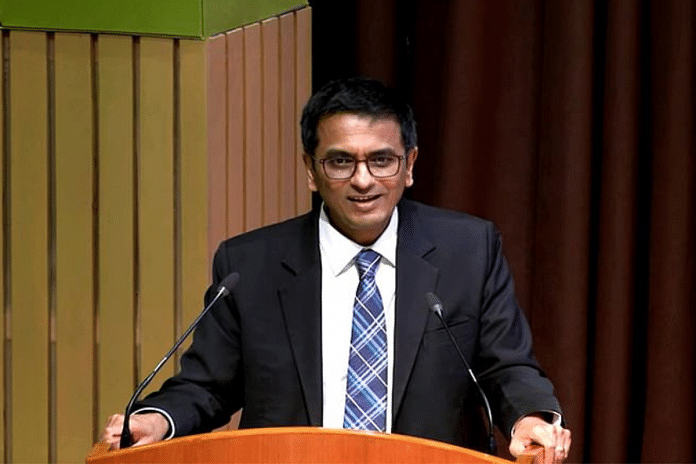New Delhi: As nearly nine Supreme Court judges face the prospect of retirement this year, Chief Justice of India D.Y. Chandrachud has introduced a new mechanism — Centre for Research & Planning (CRP) — for vetting judges before appointment by the SC Collegium.
Speaking at an event organised by the Supreme Court Bar Association (SCBA) to facilitate newly-appointed SC Judges Tuesday, CJI Chandrachud said, “The idea is to promote a sense of objectivity in the work that the Collegium does.”
At the event, the CJI shared a slew of initiatives that will herald a new era of transparency and objectivity in the Collegium system.
The innovation listed by the CJI comes at a time when there has been an increasing rift between the central government and the Supreme Court, with the SC pulling up the government over a delay in clearing recommendations for judicial appointments, saying that the consequences of such a delay “may not be palatable”.
In January this year, Union Minister of Law & Justice Kiren Rijiju had written to CJI Chandrachud seeking the formation of a ‘search-cum-evaluation’ committee comprising government representatives to advise the Collegium, in an attempt to “streamline the process”. He had proposed representatives of the State (for HC) and the Centre (for both HC and SC) must be present in this committee.
The letter was in contrast to former law minister Ravi Shankar Prasad’s statement in Parliament that the government had “no plans” to regulate the appointment of judges.
Also Read: SC collegium attaches detailed notes on 20 fresh appointments, move to mitigate govt objection
Centre for Research & Planning
According to the CJI, one initiative he has taken during his tenure was to “dovetail” the work of the CRP.
For the first time in India, the CRP has collected data on the country’s top 50 judges, he said Tuesday, adding that based on their seniority, the Collegium now has access to judgments that have been delivered by these judges during their tenure.
“This was never done before,” he added.
Flagging the upcoming cycle of retirements and appointments that are due at the Supreme Court in the summer, he said such data would come in handy during appointments.
“The CRP has some extraordinarily talented young people, including young judicial officers, who I have recruited. It will merge its activities with the Permanent Secretariat to the Chief Justice of India, which is responsible for the appointment of judges. This new model will usher in a sense of objectivity in the Collegium’s work,” the CJI said.
He added that the centre is headed by a judicial officer from the Punjab & Haryana High Court, a Harvard Law School graduate, who used to serve as the CJI’s law clerk.
Meanwhile, acknowledging the criticism the high-level-Collegium has received in the past, he said, “I ask myself a simple question: what other tribute to diversity can you have than my eight colleagues who are present today on the dais?” He was referring to Justices Dipankar Datta, Pankaj Mithal, Sanjay Karol, Sanjay Kumar, Ahsanuddin Amanullah, Manoj Mishra, Rajesh Bindal and Aravind Kumar, who were felicitated at the event.
The CJI added that his focus throughout his tenure has been on promoting transparency.
“We put up reasons for resolutions which we pass whether it is in terms of judges in the high court, the appointment of chief justices, the transfers of judges, or representation of judges,” he said referring to the SC’s practice of uploading the reasoning of the Collegium in a public forum.
He added that there is “absolutely no justification or reason” as to why there should be a vacancy in the Supreme Court, and that “it will be his aim to ensure that the SC runs at full capacity”.
Collegium system
The powerful Collegium comprises the CJI and four senior-most judges of the Supreme Court who make recommendations for the appointment of judges to the high courts and the apex court.
Interestingly, the Collegium System in India does not find recognition in the Constitution or particular legislation but is an innovation led by the judiciary itself.
In 1998, President K.R. Narayan raised a question to the SC on the appointment of judges, known as the landmark Three Judges Cases, which is the basis for the appointment of judges as it exists today.
Parliament had even attempted to establish the National Judicial Appointments Commission (NJAC) in 2013, which was seen as a mechanism to replace the Collegium. However, by a 4:1 verdict, the SC held the NJAC unconstitutional in 2015.
(Akshat Jain is a student at the National Law University, Delhi, and an intern with ThePrint)
(Edited by Richa Mishra)
Also Read: After elevation of 2 HC judges, SC collegium yet to act on its call to transfer them, say officials



